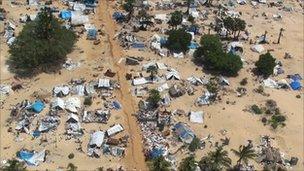Sri Lanka: UN says army shelling killed civilians
- Published
- comments

Many thousands of Tamil people were displaced over the final months of fighting in 2009
Tens of thousands of civilians died in the final phase of Sri Lanka's civil war - most of them killed in shelling by government forces, a UN panel says.
In a report on possible war crimes in the last months of the war in 2009, the panel also says Tamil Tiger rebels used civilians as human shields.
It wants an independent international investigation into "credible" reports of atrocities committed on both sides.
Sri Lanka's government has rejected the findings as biased.
It denies that tens of thousands of civilians were killed in the months leading up to the victory over the rebels, who had fought for 26 years for an independent homeland for minority Tamils.
'Credible allegations'
The highly controversial document was the result of a 10-month process of gathering evidence by the three-member panel, which was not allowed into Sri Lanka.
Their report, external paints a brutal image of the final offensive on the rebel-held enclave in northern Sri Lanka between January and May 2009.
It said that hospitals, UN centres and ships belonging to international aid group the Red Cross were deliberately shelled by government forces.
"Tens of thousands lost their lives from January to May 2009, many of whom died anonymously in the carnage of the final few days," said the panel, which was headed by a former Indonesian attorney general.
"Most civilian casualties in the final phases of the war were caused by government shelling," the report added.
It describes prisoners being shot in the head and women raped, while the Tamil Tiger rebels (LTTE) used 330,000 civilians as human shields, and shot those who tried to escape.
The UN experts said there were "credible allegations, which if proven, indicate that a wide range of serious violations of international humanitarian law and international rights law was committed both by the government of Sri Lanka and the LTTE, some of which would amount to war crimes and crimes against humanity".
It urged the government to issue a formal and public recognition of its responsibility for the extensive civilian casualties in the final stages of the conflict.
Sri Lanka had asked the UN not to publish the report, saying it could damage reconciliation efforts.
"The Sri Lankan army is not responsible and [the] Sri Lankan government is not responsible," government spokesman Lakshman Hulugalle told the BBC.
"We never shelled or we never bombed. We never targeted innocent civilians. It's a wrong allegation and we can prove it," he said.
'A matter of transparency'
The panel also recommended that the Sri Lankan government should respond to the serious allegations "by initiating an effective accountability process beginning with genuine investigations" which would meet international standards.
Secretary General Ban Ki-moon said he could not launch an international investigation into war crimes allegations unless the Sri Lankan government agreed, or member states called for it.
But the BBC's Barbara Plett, in New York, says that the country continues to have strong allies on both the UN Security Council and the Human Rights Council.
In 2010 Sri Lanka appointed its own commission mandated to look back at the war and learn lessons from the conflict, but human rights groups have expressed scepticism about the independence of the commission.
In January 2010, less than a year after the defeat of Tamil Tiger rebels, Sri Lanka's President Mahinda Rajapaksa was re-elected by a substantial majority on a wave of unprecedented support following the government's victory over the rebels.
However, the UN will carry out a review of its own actions during the conflict. The report criticises UN officials for not pressing the Sri Lankan government hard enough to exercise restraint and for not going public with high casualty figures which, it says, would have put more pressure on the government.
In a statement, the secretary general's spokesperson said: "The decision to release the report was made as a matter of transparency and in the broader public interest."
A history of the Sri Lankan conflict
He said a copy of the report had been made available "in its entirety" to the government of Sri Lanka on 12 April, adding that the government had failed to respond to a repeated offer to publish its response to the panel's finding alongside the report.
Our correspondent says that a divided Security Council was initially reluctant to address Sri Lanka's war and much less call for an inquiry.
But the secretary general appointed the panel after mounting evidence of serious human rights abuses and massive civilian casualties in the five-month offensive which ended the war.